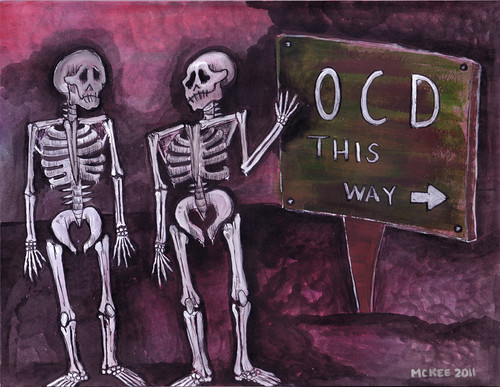
When the publicist for author
Vanessa Curtis contacted me about possibly reviewing the young adult novel,
Zelah Green: Who Says I'm a Freak? , I was intrigued, because I was a voracious reader as a teen, but do not recall any books about characters with OCD.
Zelah is in the confluence of pain between her mother dying, her father remarrying to a woman who doesn't like her, followed by her father disappearing, and her persistent need to keep germs away, and elaborate routines of cleaning, counting and physical gestures. My OCD, although present from age 9 or 10, flared when my father left and my mother was depressed, when I was 16, so I resonated with the overlap of the traumas and the rituals and the flood of anxiety, and the fear of being a freak.
Zelah is from the UK and through various twists in the plot ends up in a group treatment home for teens, run by husband and wife behavior therapists. I don't know how representative this is of the British mental health system, but it does provide a setting for Zelah's growth as she discovers other kids who are "freaks" and finds commonality of experience, and also is guided into exposure therapy for her rituals--purposely touching faucets, and toilets and not washing and moving at an incredibly rapid pace.
My main ambivalence about the book was the tendency of the therapist to dictate what step Zelah would take next in combating her OCD, and her relative quickness in doing what was asked of her. On the other hand, I did appreciate that the therapist understood Zelah's thought process, her fear of bad things happening if she didn't do her routines exactly right, and the focus on addressing the compulsive actions directly, rather than assuming that if everything was made right in her family, then her fears would magically disappear.
I remember at age 13 or 14, noticing that all the young adult novels I read were about unpopular kids, outsiders, with lives in turmoil or chaos. I wondered about that, how the characters seemed on the margins. Of course, I was on the margins as well, and I kept reading the novels, hoping for some company, some acceptance. A book like Vanessa Curtis's could have helped me feel less alone with my anxieties, and my OCD. The closest I came to having this was when I read
The Best Little Girl in the World by Steve Levenkron, about a teenage girl with anorexia.
Here is a page from my list of books. I recorded the title of each one, which was probably a compulsion.


 When the publicist for author Vanessa Curtis contacted me about possibly reviewing the young adult novel, Zelah Green: Who Says I'm a Freak? , I was intrigued, because I was a voracious reader as a teen, but do not recall any books about characters with OCD.
When the publicist for author Vanessa Curtis contacted me about possibly reviewing the young adult novel, Zelah Green: Who Says I'm a Freak? , I was intrigued, because I was a voracious reader as a teen, but do not recall any books about characters with OCD.